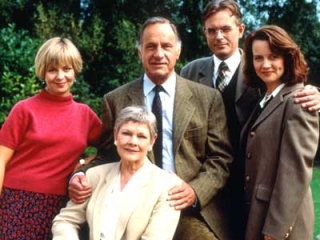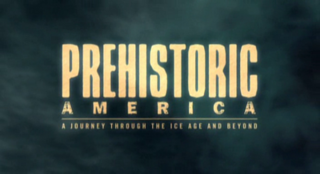
As Time Goes By is a British romantic sitcom which aired on BBC One from 12 January 1992 to 14 December 2005, running for ten series and specials. It has made it into the top 30 of Britain's Best Sitcom.

The Blue Planet is a British nature documentary series created and produced by the BBC. It premiered on 12 September 2001 in the United Kingdom. It is narrated by David Attenborough.

Serious is an observational documentary series made by the BBC and broadcast as part of their children's programming. It encompasses Serious Jungle (2002), Serious Desert (2003), Serious Arctic (2005), Serious Amazon (2006), Serious Andes (2007), Serious Ocean (2008) and Serious Explorers (2011). Serious Ocean consisted of ten 30-minute episodes, while each previous series was six 30-minute episodes. In each series a group of eight 12- to 15-year-olds embark on an expedition to an extreme part of the world, in order to help wildlife or assist in environmental projects. The programmes have won numerous awards, among them honours from BAFTA and the Royal Television Society.

The Life Collection is a 24-disc DVD box set of eight titles from David Attenborough's 'Life' series of BBC natural history programmes. It was released in the UK on 5 December 2005 and has also been made available on Region 4 DVD in Australia and New Zealand. The Region 4 DVD contains four fewer discs as Life on Earth is not included. It has not yet been issued in Region 1 encoding for the US.

A nature documentary or wildlife documentary is a genre of documentary film or series about animals, plants, or other non-human living creatures, usually concentrating on video taken in their natural habitat but also often including footage of trained and captive animals. Sometimes they are about wildlife or ecosystems in relationship to human beings. Such programmes are most frequently made for television, particularly for public broadcasting channels, but some are also made for the cinema medium. The proliferation of this genre occurred almost simultaneously alongside the production of similar television series.

Planet Earth is a 2006 British television series produced by the BBC Natural History Unit. Five years in the making, it was the most expensive nature documentary series ever commissioned by the BBC and also the first to be filmed in high definition. The series received multiple awards, including four Emmy Awards, a Peabody Award, and an award from the Royal Television Society.

Andes to Amazon is a nature documentary TV series co-produced by the BBC Natural History Unit in Bristol, England and Animal Planet, first transmitted in the UK on BBC2 in November 2000. In other territories it was broadcast under the title Wild South America

Wild Africa is a British nature documentary series created and produced by the BBC. It explores the natural history of the African continent. It was first transmitted on 7 November 2001 on BBC Two in the United Kingdom and comprises six episodes. Each concentrates on a particular environment. The producers use aerial photography and wildlife footage to show how natural phenomena such as seasonal changes influence the patterns of life. Wild Africa was produced by the BBC Natural History Unit and narrated by Fergal Keane.

Wild Caribbean is a four-part BBC nature documentary series exploring the natural and cultural history of the Caribbean Islands and Sea. It was first transmitted in the UK on BBC Two in January 2007. The series was produced by the BBC Natural History Unit and narrated by actor Steve Toussaint. This series also aired in Australia on ABC1 each Sunday at 7:30pm from 15 February 2009.
This is a chronological list of selected television programmes and feature films produced or co-produced by the BBC Studios Natural History Unit since its inception in 1957. It is not intended to be exhaustive given the large amount of material the Unit has produced in its history, but it does capture all the major TV series and films for which it has gained recognition. A brief synopsis of pre-1957 radio and television programmes on a natural history theme made by the BBC is given in the History section of the main BBC Studios Natural History Unit article.

Wild China is a six-part nature documentary series on the natural history of China, co-produced by the BBC Natural History Unit and China Central Television (CCTV) and filmed in high-definition (HD). It was screened in the UK on BBC Two from 11 May to 5 June 2008. The English narration was provided by Bernard Hill and the series produced by Phil Chapman for the BBC and Gao Xiaoping for CCTV. The Chinese version was broadcast under the title Beautiful China. In Canada, it was broadcast on CBC as part of the series The Nature of Things narrated by David Suzuki. Wild China was broadcast in Australia on ABC1 and ABC HD each Sunday at 7:30pm from 18 May 2008.

Land of the Tiger is a BBC nature documentary series exploring the natural history of the Indian subcontinent, first transmitted in the UK on BBC Two in 1997. The production team covered the breadth and depth of India, from the Himalayan mountains in the north to the reef-fringed islands of the Indian Ocean, to capture footage of the country's wild places and charismatic wildlife.

Wild New World is a six-part BBC documentary series about Ice Age America that describes the prehistory, landscape and wildlife of the continent from the arrival of humans to the welcome of the Ice Age. It was first transmitted in the UK & JP on BBC Two from 3 October to 7 November 2002. Like several other BBC programmes, it contains both computer graphics and real-life animals. Occasionally, footage of non-American counterparts of the Living North American beasts are used in juxtaposition with footage of native American animals, like the pronghorn.
The Fruitties is an animated television series produced in Spain by D'Ocon Film Productions in 1989., created by Antoni D'Ocon and written by Josep Viciana. It originally aired on the Spanish television channel TVE Originally, 91 episodes were created – each 25 minutes long – but the series was often repackaged as 52 episodes. The series was dubbed into many languages and, in 1991, an English-language version of the show made its debut on British television.

Bushcraft is a survival television series hosted by Ray Mears. The series airs on the BBC in United Kingdom, it also shown on Discovery Channel in the United States, Canada, India, Italy, Brazil, New Zealand, Australia, Czech Republic, Norway, Sweden, The Netherlands, Romania and Russia. Following on from Extreme Survival, Bushcraft was first shown in 2004, and ended in 2005.

The New Adventures of Black Beauty was a television drama series produced in the early 1990s. The show was produced first in New Zealand, then in Australia. The two different productions had different characters and plotlines, un-related except through the horse, Black Beauty.

Human Planet is an 8-part British television documentary series. It is produced by the BBC with co-production from Discovery and BBC Worldwide. It describes the human species and its relationship with the natural world by showing the remarkable ways humans have adapted to life in every environment on Earth. The show drew attention for alleged fakery and the BBC eventually acknowledged that a number of scenes were inaccurately depicted or misleading and withdrew the series from distribution.

Africa is a 2013 British television series created by the BBC Natural History Unit. It focuses on wildlife and wild habitats in Africa, and was four years in the making. It consists of six hour-long episodes and six 10-minute-long featurettes.

Hidden Kingdoms is a British documentary television series that was first broadcast on BBC One on 16 January 2014. The three-part series is narrated by Stephen Fry and shows how animals experience the world from their perspective. Animals shown include a chipmunk, dung beetle, Rufous elephant shrew and treeshrew, and Japanese rhinoceros beetle.
Dynasties is a 2018 British nature documentary series on five vulnerable or endangered species known to form enduring populations: chimpanzee, emperor penguin, lion, tiger and African wild dog. The series is produced by the BBC Natural History Unit and narrated by David Attenborough. The music score was composed by Benji Merrison. Each episode ends with Dynasties On Location, a behind the scenes look at the planning of each episode, which could be years in advance before production crew even started filming.